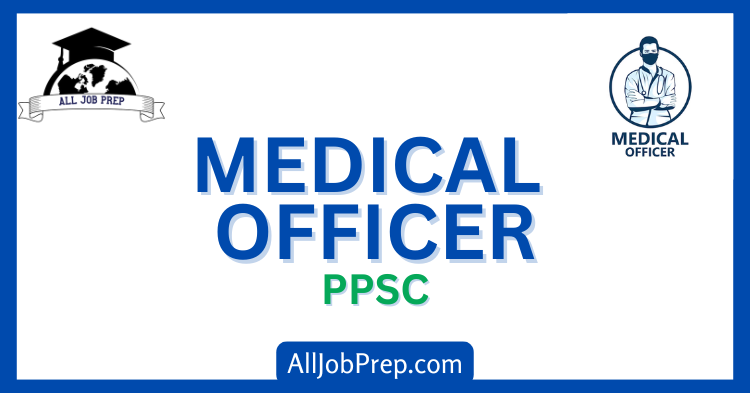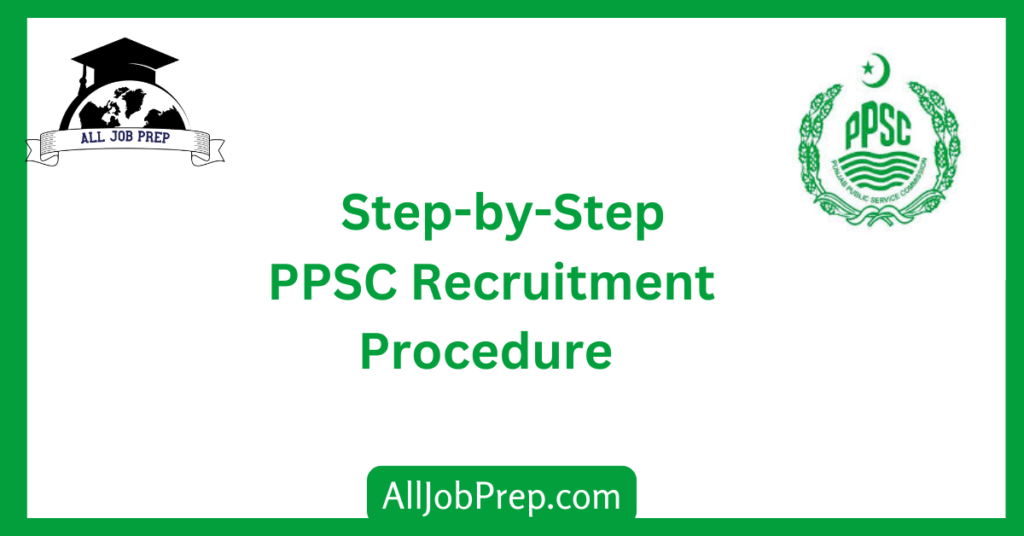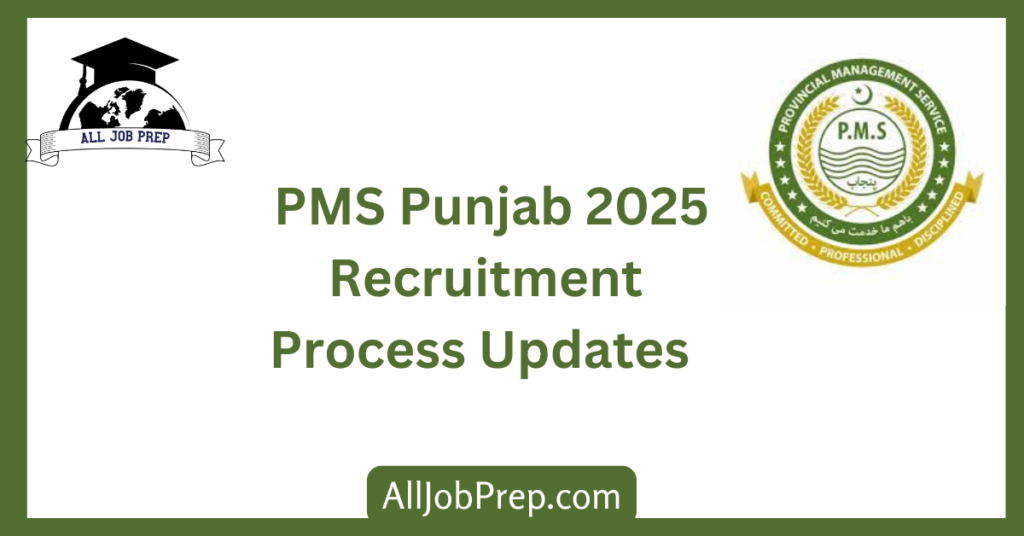The Punjab Public Service Commission (PPSC) has announced job openings for Medical Officers (BS-17) in the Social Welfare & Bait-ul-Maal Department, Government of Punjab. Below is a detailed breakdown of the advertisement to help applicants understand the eligibility criteria, application process, and key details.
LAST DATE TO APPLY: 13 January 2025
Job Details
| Title | Details |
|---|---|
| Position | Medical Officer (BS-17) |
| Department | Social Welfare & Bait-ul-Maal Department, Government of Punjab |
| Type of Employment | Contract (5 years) |
| Case Number | 141-RG/2024 |
| Total Vacancies | 15 |
| Quota Distribution | Open Merit: 01, Women Quota: 13, Minority Quota: 01 |
| Posting Location | All over Punjab |
Eligibility Criteria
1. Educational Qualifications
Candidates must meet the following educational requirements:
- Degree: MBBS (minimum 2nd Division).
- Preference: Experience in dealing with mentally retarded children is advantageous.
2. Professional Registration
Candidates must have a valid registration with the Pakistan Medical and Dental Council (PMDC) or Pakistan Medical Commission (PMC).
- Full Permanent Medical Registration: Must be issued on or before the application closing date.
- Evidence of Application: Candidates without issued certificates must provide proof of application submission before the deadline.
- House Job Certificate: Provisional PMDC/PMC certificates for house jobs are not acceptable.
3. House Job Requirement
A regular one-year house job is mandatory for eligibility.
4. Renewal of Registration
- Applicants with expired registrations must apply for renewal before the closing date.
- Proof of renewal application must be provided if renewal is pending.
Age Limit
| Category | Age Range | Relaxation | Maximum Age |
|---|---|---|---|
| Male | 22 to 30 years | 5 years | 35 years |
| Female | 22 to 30 years | 8 years | 38 years |
| Transgender | As per CNIC details | As applicable | As applicable |
Gender and Domicile
| Criteria | Details |
|---|---|
| Gender | Male, Female, Transgender |
| Domicile | Punjab Province only |
| Posting Location | Anywhere in Punjab |
Selection Process
1. Written Examination/ Test
- A written test may be conducted.
- The syllabus for the test will be uploaded later on the PPSC website.
2. Application and Document Verification
- All required documents must be submitted online by the closing date.
- Eligibility will be verified against the provided qualifications, experience, and registration certificates.
How to Apply
Step-by-Step Application Process
- Visit the PPSC Website
Go to the official Punjab Public Service Commission (PPSC) website. - Create an Account
- Register with your email address.
- Fill out personal details and upload required documents.
- Fill Application Form
- Select the relevant job case number (141-RG/2024).
- Provide accurate information regarding your qualifications and experience.
- Upload Required Documents
- CNIC
- MBBS degree
- PMDC/PMC registration certificate
- House job certificate
- Domicile
- Submit Application Fee
- Pay the required fee at designated banks and upload proof of payment.
- Submit Application
- Review your application before final submission.
Key Highlights
| Feature | Details |
|---|---|
| Contract Duration | 5 years (extendable based on performance) |
| Preference | Experience with mentally retarded children is preferred. |
| Test Syllabus | To be announced on the PPSC website. |
| Application Deadline | Ensure all documents are submitted before the closing date. |
| Important Reminder | Provisional PMDC/PMC registration certificates are not acceptable. |
Important Tips for Applicants
- Check Registration Status: Ensure your PMDC/PMC registration is valid or evidence of application is ready.
- Stay Updated: Regularly visit the PPSC website for updates on the test syllabus.
- Document Organization: Keep all documents scanned and ready to upload during the application process.
- Prepare for the Test: Focus on revising medical knowledge, especially topics relevant to mental health and general practice.
This opportunity is ideal for MBBS graduates aiming to serve in the government sector. Ensure you meet all criteria and apply before the deadline to secure your chance to contribute to Punjab’s healthcare system. For more details, visit the official PPSC website.
FAQs
What Does a Medical Officer Do?
A Medical Officer (MO) plays a crucial role in the healthcare system. They are responsible for ensuring the well-being of patients, managing healthcare teams, and overseeing medical operations. Below is an in-depth exploration of the responsibilities, qualifications, and skills required for this pivotal role.
Who is a Medical Officer?
A Medical Officer is a senior healthcare professional, often a doctor, who supervises medical services in hospitals, clinics, or other healthcare facilities. They provide expert advice, lead medical teams, and ensure the delivery of high-quality care to patients.
Key Responsibilities of a Medical Officer
1. Patient Care
- Diagnose and treat patients.
- Monitor patients’ progress and adjust treatments as necessary.
- Provide preventive care and health education to patients.
2. Supervision and Management
- Lead and supervise medical and support staff.
- Coordinate with other departments for efficient patient care.
- Ensure adherence to medical protocols and standards.
3. Administrative Duties
- Oversee medical records and ensure their accuracy.
- Manage budgets, resources, and supplies.
- Develop and implement policies for improved healthcare delivery.
4. Training and Mentorship
- Train junior doctors and medical staff.
- Provide guidance and mentorship to medical interns and residents.
5. Research and Development
- Participate in medical research to improve healthcare practices.
- Stay updated with the latest medical advancements.
- Develop strategies for disease prevention and treatment.
Work Settings for Medical Officers
| Setting | Role |
|---|---|
| Hospitals | Oversee inpatient care and manage medical teams. |
| Clinics | Provide outpatient care and lead smaller teams. |
| Public Health Departments | Develop health policies and oversee community health initiatives. |
| NGOs | Manage medical projects and disaster relief programs. |
| Research Institutions | Conduct clinical research and trials. |
Skills Required to be a Successful Medical Officer
| Skill | Description |
|---|---|
| Clinical Expertise | Deep knowledge of medical practices and treatments. |
| Leadership | Ability to manage and inspire healthcare teams. |
| Decision-Making | Quick and accurate judgment in critical situations. |
| Communication | Clear communication with staff and patients. |
| Problem-Solving | Addressing complex medical and administrative issues effectively. |
| Empathy | Understanding patient needs with compassion. |
Qualifications to Become a Medical Officer
| Requirement | Details |
|---|---|
| Education | MBBS degree (Bachelor of Medicine and Surgery). |
| Postgraduate Training | Specialization or experience in a relevant field. |
| Registration | Must be registered with a recognized medical council (e.g., PMDC). |
| Experience | Several years of clinical or administrative experience. |
Challenges Faced by Medical Officers
- Workload Management: Handling multiple responsibilities simultaneously.
- Resource Limitations: Ensuring care with limited resources in public healthcare.
- Stressful Environment: Managing critical and emergency situations.
- Balancing Roles: Combining clinical, administrative, and leadership duties.
Why Are Medical Officers Important?
- Quality Care: They ensure high standards of care and patient safety.
- Policy Implementation: Help enforce healthcare regulations and protocols.
- Team Leadership: Guide and motivate medical teams for better outcomes.
- Community Impact: Contribute to public health through outreach programs.
How to Become a Medical Officer?
1. Academic Path
- Complete an MBBS degree.
- Pursue postgraduate training or specialization if required.
2. Gain Clinical Experience
- Work as a house officer or junior doctor.
- Gain exposure to various medical departments.
3. Develop Leadership Skills
- Take on supervisory roles in healthcare settings.
- Attend workshops on healthcare management.
4. Apply for MO Positions
- Monitor job openings in government or private sectors.
- Prepare for competitive exams if required, such as through PPSC.
Career Growth for Medical Officers
Medical Officers can advance to higher roles, including:
- Senior Medical Officer
- Medical Superintendent
- Healthcare Consultant
- Public Health Expert
Conclusion
Medical Officers are the backbone of healthcare systems, ensuring quality patient care, efficient team management, and adherence to medical standards. Their multifaceted role combines clinical expertise with administrative leadership, making them indispensable in any healthcare setting.
If you aspire to become a Medical Officer, focus on building strong clinical skills, gaining relevant experience, and developing leadership qualities.







